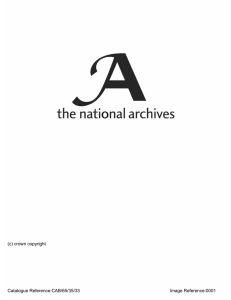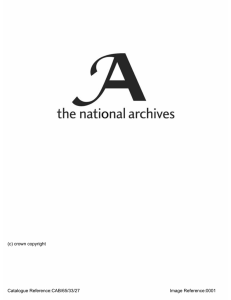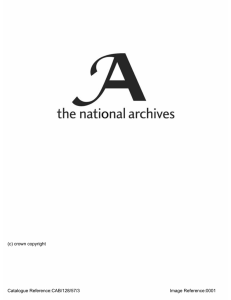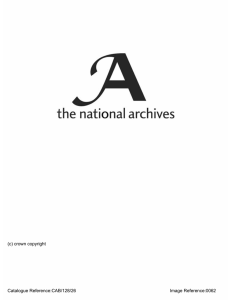(c) crown copyright Catalogue Reference:CAB/128/26 Image Reference:0056
advertisement
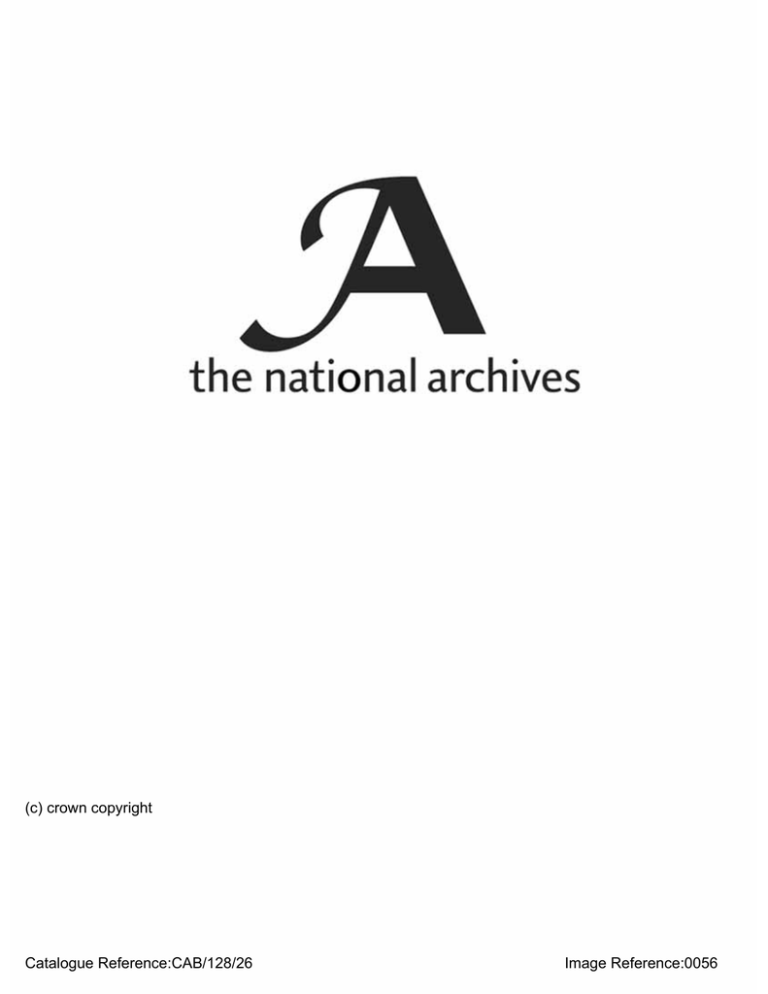
(c) crown copyright Catalogue Reference:CAB/128/26 Image Reference:0056 THIS DOCUMENT IS T H E P R O P E R T Y OF HER BRITANNIC Printed for the Cabinet. SECRET CABINET C C . (53) - W f 1 J October MAJESTY^ 1953 OFFICE U U r " GOVERNMENT Copy N o . Y 56th Conclusions CABINET CONCLUSIONS of a Meeting of the Cabinet held at 10 Downing on Thursday, 8th October, 1953, at 6 p.m. Street, S.W.1, Present: The Right Hon. Sir WINSTON CHURCHILL, M.P., Prime Minister (in the Chair). The Right Hon. ANTHONY E D E N , M.P., The Most Hon. the MARQUESS OF SALISBURY, Lord President of the Secretary of State for Foreign Affairs. Council. The Right Hon. LORD SIMONDS, Lord The Right Hon. H. F . C . CROOKSHANK, Chancellor. M.P., Lord Privy Seal. The Right Hon. the EARL ALEXANDER The Right Hon. OLIVER LYTTELTON, OF TUNIS, Minister of Defence. M.P., Secretary of State for the Colonies. The Right Hon. Sir WALTER MONCKTON, The Right Hon. HAROLD MACMILLAN, Q.C., M.P., Minister of Labour and M.P., Minister of Housing and Local Government. National Service. The Right Hon. Sir THOMAS DUGDALE, M.P., Minister of Agriculture and Fisheries. Secretariat: The Right Hon. Sir NORMAN BROOK. Mr. R. M . J . HARRIS. CONTENTS: Minute No. Subject Page 1 British Guiana 22 2 Trieste 23 \ 7**3 S British Guiana. (Previous Reference: C C . (53) 55th Conclusions, Minute 1.) 1. The Cabinet considered the latest developments in British Guiana. The Colonial Secretary said that it had hitherto been intended that, as soon as British troops were deployed in the territory, the Governor should take the following action: — (i) assume emergency powers under the Order-in-Council made at Balmoral on 4th October; (ii) remove the Ministers' portfolios under the emergency powers; (hi) publish a statement of Her Majesty's Governments policy and announce the intention to suspend the constitution; (iv) arrest the leaders of the People's Progressive Party. Suspension of the constitution could not be effected without Parlia­ mentary action at Westminster and must, therefore, await the reassembly of Parliament. Under the emergency powers now avail­ able, however, the Ministers could in the meanwhile be relieved of their responsibility, although they would technically remain Ministers so long as the constitution remained in force. The Royal Welch Fusiliers had now landed at Georgetown. Their reception had been friendly and the situation in the town was entirely calm. In these circumstances the Governor had urged that, while action under (i)-(iii) above should be taken as planned, no arrests should be made unless there were further developments in the situation. He (the Colonial Secretary) remained of the opinion that there was ample justification for immediate arrests, but he agreed that it would be inexpedient to make the arrests at the present moment, when there had been no public disorder in the Colony. He had, therefore, with the Prime Ministers approval, instructed the Governor to proceed with the action summarised in (i)-(iii) above but to await developments before making any arrests and, if possible, to refer to him before making them (Colonial Office telegram No. 78 to Sir A. Savage of 8th October). The Prime Minister said that he had no doubt that this was the right course. Removal of the Ministers' portfolios and suspension of the constitution could be abundantly justified on the ground that Ministers had been given a fair trial but had demonstrated that their management of the Colony's affairs could only lead to its ruin. It would, however, be very much harder to justify arresting and detain­ ing men who would of necessity remain Ministers for the time being if they were not to be charged with any specific offence and conditions in the Colony remained quiet. There was general support in the Cabinet for the course which it was now proposed to follow, although it was recognised that this might well make it necessary for the troops to remain in the territory for a longer period. It was also recognised that, if the Ministers were left at liberty after being relieved of their functions, they would be likely to make as much capital as they possibly could out of the position and might seek to stir up disaffection by agitation and possibly strike action. While it was agreed that it would not be politic to arrest them at the moment, Ministers considered that they should not be allowed indefinitely to flout the Government of the Colony and Her Majesty's Government before the eyes of the world. The Minister of Defence asked whether the battalion of Argyll and Sutherland Highlanders which was about to leave this country for Georgetown should still proceed thither or be diverted to Jamaica, and whether the move of the battalion of the Gloucestershire Regiment, which was due to sail from Liverpool on 14th October for Jamaica, should be cancelled. The Cabinet— (1) Endorsed the instructions sent to the Governor of British Guiana in Colonial Office telegram No. 78 of 8th October. 23 C X . 56 (53) (2) Agreed that the projected move of the Argyll and Sutherland Highlanders to Georgetown should proceed on the under­ standing that they could be diverted to Jamaica en route if the development of the situation in British Guiana appeared to justify this course. (3) Agreed that no overt action should be taken for the time being in regard to the proposed move of the First Battalion of the Gloucestershire Regiment to Jamaica, on the understanding that the position should be reviewed in three to four days' time. Trieste. (Previous Reference: C.C. (53) 54th Conclusions, Minute 3.) 2 . The Foreign Secretary said that the British and United States Ambassadors in Rome and Belgrade had now made the initial corn­ munications to the Italian and Yugoslav Governments in accordance with the plan, approved by the Cabinet on 2 n d October, for bringing about a de facto settlement of the Trieste problem. These corn­ munications had been received reasonably well. Tito's response, in particular, had been less violent than might have been expected: he had not threatened to annex Zone B of the Free Territory. The C a b i n e t Took note of the Foreign Secretary's statement. Cabinet Office, S.W.1, 9th October, 1953.
